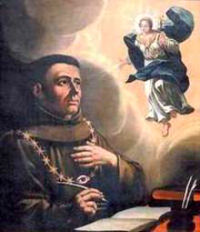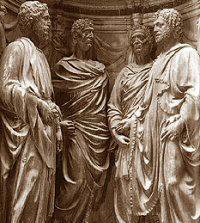
Baptism of Christ
Domenico Ghirlandaio
c. 1473
Fresco
Sant'Andrea a Brozzi, San Donnino
Posted on 11/07/2014 8:08:38 PM PST by Salvation
Feast Day: November 8
St. Godfrey
Feast Day: November 8
Born: 1066 :: Died: 1115
Godfrey was born at Soissons in France. From the age of 5, he was raised in the Benedictine abbey of Mont-Saint-Quentin where his godfather Godefroid was the abbot (like a parish priest). At the abbey Godfrey was immediately given a Benedictine habit and he lived as a tiny monk. The monks there educated him.
When he became of age he became a monk and then a priest. He was chosen to be abbot of the monastery in Champagne, France. The monastery was run-down and weeds had taken over. Only six monks and two children remained.
The monks liked Godfrey. They realized that he was a holy man and admitted that he could help them find again the joy of a self-sacrificing life. Soon the eager community attracted new candidates who joined them. The abbey of Champagne became a center of prayer and spiritual joy.
Then Godfrey was made an archbishop. He was given the well-known diocese of Rheims, in France. He did not want to leave the small monastery but knew, that the Lord wanted him to reach out to the people of Rheims as well.
He still lived like a simple monk. His house was poor but clean and his food was plain. Once in a while, his cook prepared food that seemed to him too fancy and rich. Godfrey would wait until the cook went out on errands. Then he would call in the poor people who lived nearby and give them the food to take home to their families.
Archbishop Godfrey suffered because he was very strict and would not tolerate drunkenness or other wrongdoing by his parishioners. When Godfrey tried to correct these people, some of them began to hate him. One person even tried to kill him.
It was then that Godfrey wondered if he was doing more harm than good. But people with good will appreciated and loved him. Godfrey longed to resign as a Bishop and retire as a monk so he could live alone with God. But before he could resign, he died at the age of fifty.
| Luke | |||
| English: Douay-Rheims | Latin: Vulgata Clementina | Greek NT: Byzantine/Majority Text (2000) | |
| Luke 16 |
|||
| 9. | And I say to you: Make unto you friends of the mammon of iniquity; that when you shall fail, they may receive you into everlasting dwellings. | Et ego vobis dico : facite vobis amicos de mammona iniquitatis : ut, cum defeceritis, recipiant vos in æterna tabernacula. | καγω υμιν λεγω ποιησατε εαυτοις φιλους εκ του μαμωνα της αδικιας ινα οταν εκλιπητε δεξωνται υμας εις τας αιωνιους σκηνας |
| 10. | He that is faithful in that which is least, is faithful also in that which is greater: and he that is unjust in that which is little, is unjust also in that which is greater. | Qui fidelis est in minimo, et in majori fidelis est : et qui in modico iniquus est, et in majori iniquus est. | ο πιστος εν ελαχιστω και εν πολλω πιστος εστιν και ο εν ελαχιστω αδικος και εν πολλω αδικος εστιν |
| 11. | If then you have not been faithful in the unjust mammon; who will trust you with that which is the true? | Si ergo in iniquo mammona fideles non fuistis quod verum est, quis credet vobis ? | ει ουν εν τω αδικω μαμωνα πιστοι ουκ εγενεσθε το αληθινον τις υμιν πιστευσει |
| 12. | And if you have not been faithful in that which is another's; who will give you that which is your own? | Et si in alieno fideles non fuistis, quod vestrum est, quis dabit vobis ? | και ει εν τω αλλοτριω πιστοι ουκ εγενεσθε το υμετερον τις υμιν δωσει |
| 13. | No servant can serve two masters: for either he will hate the one, and love the other; or he will hold to the one, and despise the other. You cannot serve God and mammon. | Nemo servus potest duobus dominis servire : aut enim unum odiet, et alterum diliget : aut uni adhærebit, et alterum contemnet. Non potestis Deo servire et mammonæ. | ουδεις οικετης δυναται δυσιν κυριοις δουλευειν η γαρ τον ενα μισησει και τον ετερον αγαπησει η ενος ανθεξεται και του ετερου καταφρονησει ου δυνασθε θεω δουλευειν και μαμωνα |
| 14. | Now the Pharisees, who were covetous, heard all these things: and they derided him. | Audiebant autem omnia hæc pharisæi, qui erant avari : et deridebant illum. | ηκουον δε ταυτα παντα και οι φαρισαιοι φιλαργυροι υπαρχοντες και εξεμυκτηριζον αυτον |
| 15. | And he said to them: You are they who justify yourselves before men, but God knoweth your hearts; for that which is high to men, is an abomination before God. | Et ait illis : Vos estis qui justificatis vos coram hominibus : Deus autem novit corda vestra : quia quod hominibus altum est, abominatio est ante Deum. | και ειπεν αυτοις υμεις εστε οι δικαιουντες εαυτους ενωπιον των ανθρωπων ο δε θεος γινωσκει τας καρδιας υμων οτι το εν ανθρωποις υψηλον βδελυγμα ενωπιον του θεου |

Saturday, November 8
Liturgical Color: Green
Pope St. Deusdedit died on this day in
618 A.D. His reign of 3 years was known
for its charity and support for his clergy.
When Rome was plagued by leprosy, he
went into the streets himself to help
relieve the suffering.

Daily Readings for:November 08, 2014
(Readings on USCCB website)
Collect: Almighty and merciful God, by whose gift your faithful offer you right and praiseworthy service, grant, we pray, that we may hasten without stumbling to receive the things you have promised. Through our Lord Jesus Christ, your Son, who lives and reigns with you in the unity of the Holy Spirit, one God, for ever and ever.
RECIPES
ACTIVITIES
o Praying for the Dead and Gaining Indulgences During November
PRAYERS
o November Devotion: The Holy Souls in Purgatory
o Little Litany of the Holy Souls
LIBRARY
o Address of John Paul II to the Members of the Scotus Commission | Pope John Paul II
o Faith and Reason Together in the Thought of Duns Scotus | Pope Benedict XVI
o Historical Development of the Dogma of the Immaculate Conception | Rev. Francis J. Connell C.SS.R.
o John Duns Scotus | Pope Benedict XVI
o John Duns Scotus: Champion of the Immaculate Conception | Brother John M. Samaha S.M.
· Ordinary Time: November 8th
· Friday of the Thirty-First Week in Ordinary Time; Bl. John Duns Scotus, priest
Old Calendar: Holy Four Crowned Martyrs
Newly beatified in 1993 by St. John Paul II, the Franciscans and other particular calendars may celebrate the optional memorial of Blessed John Duns Scotus, a Scottish Franciscan priest and theologian who died in 1308. He was the founder of the Scotistic School in Theology, and until the time of the French Revolution his thought dominated the Roman Catholic faculties of theology in nearly all the major universities of Europe. He is chiefly known for his theology on the Absolute Kingship of Jesus Christ, the Immaculate Conception of the Blessed Virgin Mary, and his philosophic refutation of evolution. He is also known as the "Doctor of Mary Immaculate" because of his defense of the Immaculate Conception.
According to the 1962 Missal of St. John XXIII the Extraordinary Form of the Roman Rite, today is the commemoration of the Holy Four Crowned Martyrs, a group of five Christian sculptors of Hungary, martyred under Diocletian in 306. Their bodies were taken to Rome, where a biographer's error confused them with four martyrs of Albano. The basilica of the four crowned saints, built on the Coelian Hill, is one of the most characteristic of medieval Rome.
Don't forget to pray for the Poor Souls in Purgatory from November 1 to the 8th.
Bl. John Duns Scotus John Duns Scotus was probably born in the winter of 1266 in the South of Scotland. Around 1279 he was accepted in a Franciscan friary in South Scotland. After eight years of preliminary studies in philosophy, or rather in the artes, at Oxford, he started to study theology there in 1288. Having attained the age of 25 he was ordained a priest in Northampton on March 17th 1291.
John Duns Scotus was probably born in the winter of 1266 in the South of Scotland. Around 1279 he was accepted in a Franciscan friary in South Scotland. After eight years of preliminary studies in philosophy, or rather in the artes, at Oxford, he started to study theology there in 1288. Having attained the age of 25 he was ordained a priest in Northampton on March 17th 1291.
In the academic year 1297-98 John Duns prepared his first theological course which would change his life. During the next year he gave this course, on the Sentences of Peter Lombard, the most important textbook of systematic theology at the time. During these years (1297-99) Duns wrote Lectura I-II, his lecture notes on the two first books of the Sentences. Scotus' course based on these notes not only impressed his audience very much, but also the Franciscan leadership, and established his name as an exceptionally penetrating and original thinker.
In the summer of 1301 Scotus had fulfilled all the requirements for being a master (magister). However, he was sent to Paris by the Franciscan leadership in order to continue a Parisian career, at the most prestigious university of Europe.
After having again taught on the Sentences for a year, he and some of his colleagues were banished in June 1303 from Paris because of a conflict between the French king Philip IV and Pope Boniface VIII. He returned to his studium at Oxford and probably spent the first half of 1304 in Cambridge.
At the end of the summer of 1304 he was already back in Paris where he became professor of theology in 1306. Duns Scotus and his socius continued to work very hard on his Ordinatio together with a staff of assistants. The Ordinatio was meant to be the definitive edition of his Commentary on the Sentences. For this edition he used his Lectura I-III and Reportatio Parisiensis IV and piles of other materials he had prepared in the meantime.
In 1307 Duns leaves Paris again, but this time he left for Cologne in order to become the professor of theology at the Franciscan House of Studies (Studium). On November 8, 1308 he suddenly died in Cologne, leaving behind quite a number of unfinished works, including his Ordinatio.
Excerpted from Research Group John Duns Scotus
Things to Do:
Holy Four Crowned Martyrs (Severus, Severian, Carpophorus & Victorinus) The history of these holy martyrs is very confusing. The Martyrology has this: "At Rome on the Via Lavicana the day of the death of four holy martyrs, the brothers Severus, Severianus, Carpophorus, and Victorinus. Under Emperor Diocletian they were scourged to death with lead rods. Their names were first made known many years later through a divine revelation. As no one knew their names previously, the annual feastday to their honor was celebrated under the title: The Four Crowned Brothers. The designation was retained even after the revelation."
The history of these holy martyrs is very confusing. The Martyrology has this: "At Rome on the Via Lavicana the day of the death of four holy martyrs, the brothers Severus, Severianus, Carpophorus, and Victorinus. Under Emperor Diocletian they were scourged to death with lead rods. Their names were first made known many years later through a divine revelation. As no one knew their names previously, the annual feastday to their honor was celebrated under the title: The Four Crowned Brothers. The designation was retained even after the revelation."
The basilica of the Four Crowned Martyrs also contains the relics of five sculptors who under Diocletian refused to make idols or to venerate sun-god pictures. Reports say they were scourged, placed in lead coffins and submerged in a stream (c. 300). Hagiographers are trying to disentangle the conflicting statements on the relation of these two groups to one another, whether two groups actually existed, whether they were Pannomians or Romans, soldiers or stone-masons, etc.
Excerpted from The Church's Year of Grace, Pius Parsch
St. Godfrey
St. Godfrey was born into the wealth and prestige of the counts of Cappenberg. In his early adulthood he played an active role in supporting the cause of the Roman Pontiff against Emperor Henry IV.
In 1121 he encountered St. Norbert at Cologne and was so struck by his lifestyle and preaching that he immediately made plans to give away all his possessions and enter the infant Norbertine Order. Together with his brother Otto and his wife Judith, he handed over Cappenberg Castle to St. Norbert on May 31, 1122, thus establishing the first foundation of the Order in Germany. Both Otto and Judith followed Godfrey’s example and embraced the religious life of the new Order. The further donation of his estates at Varlar and Ilbenstadt to St. Norbert caused an uproar among the local nobility who viewed it as a threat to their established aristocracy. Under the leadership of Godfrey’s hostile father-in-law, Frederick of Arnsberg, an unsuccessful military assault was made upon the new monastery at Cappenberg. Through all of these trials Godfrey remained steadfast in his desire to be a Norbertine.
When things calmed down, Godfrey received the habit from the hand of St. Norbert. He especially loved to care for the poor and sick in the hospital attached to the abbey. St. Norbert wanted to have him by his side at Magdeburg, but Godfrey felt out of place in the noisy northern metropolis and was granted permission to return to Cappenberg. It was on his way back to Mt. Cappenberg that Godfrey fell sick at Ilbenstadt. Surrounded by his brethren and his brother Otto, he made peace with them all: “My brothers, through love for the Order, through zeal for the glory of God, I have occasionally reprimanded some of you a bit too harshly. I beg pardon from you now.” Moments later, seeing a vision of angels, Godfrey exclaimed, “How beautiful! How beautiful! The messengers of my Creator and God have finally come!” With that he fell asleep in the Lord. It was January 13, 1127.
Excerpted from Norbertine Vocations
Indulgences for All Souls Week
An indulgence, applicable only to the Souls in Purgatory, is granted to the faithful, who devoutly visit a cemetery and pray, even if only mentally, for the departed. The indulgence is plenary each day from the first to the eighth of November; on other days of the year it is partial.
A plenary indulgence, applicable only to the Souls in Purgatory, is granted to the faithful, who on the day dedicated to the Commemoration of All the Faithful Departed [November 2 {as well as on the Sunday preceding or following, and on All Saints' Day}] piously visit a church. In visiting the church it is required that one Our Father and the Creed be recited.
To acquire a plenary indulgence it is necessary also to fulfill the following three conditions: sacramental Confession, Eucharistic communion, and prayer for the intention of the Holy Father. The three conditions may be fulfilled several days before or after the performance of the visit; it is, however, fitting that communion be received and the prayer for the intention of the Holy Father be said on the same day as the visit.
The condition of praying for the intention of the Holy Father is fully satisfied by reciting one Our Father and one Hail Mary. A plenary indulgence can be acquired only once in the course of the day.
Common of the Blessed Virgin Mary
I am eager for the profit that accrues to your account. (Philippians 4:17)
Many cultures take gift giving very seriously. The Japanese are a prime example. In Japan, you are expected to bring a gift when visiting someone. You should present your gift modestly, using both hands and saying something like, “This is really nothing, but …” Moreover, when receiving a gift, it’s considered polite to refuse it two or three times before finally accepting it. These customs may seem strange to people from other cultures, but they convey the idea that the mere gesture of giving is just as important as the gift itself.
Paul is saying something similar when he tells the Philippians that he doesn’t need their money, even though he is glad to have it. Paul is clearly self-sufficient and doesn’t need anyone to hold his hand! He left home when young to study under the great rabbi Gamaliel. Then, when he became an apostle, he supported himself by making tents rather than rely on people’s donations (Acts 18:3; 22:3).
So when Paul says, “I am eager for the profit that accrues to your account” (Philippians 4:17), he isn’t thanking the Philippians so much for covering his expenses, as for meeting their own spiritual needs!
It may clarify this point to think about what happens at Mass. There we offer gifts of bread and wine to God, as well as our financial gifts. We do so in a spirit of humility, recognizing that God doesn’t need them. Try to imagine God, out of a desire to be polite, saying, “That’s very generous, but you didn’t need to bring me anything. I just enjoy having you with me. Your presence is gift enough.” But then he accepts your gift happily and uses it to build up his Church. Your generosity, your care for his people in need, fills him with delight.
With that in mind, try to get to Mass a little early tomorrow so you can spend a few minutes in silent prayer. Offer Jesus everything you can think of: your work, your vocation, your finances, your struggles and pains, your loved ones, even your enemies! Honor him with your gifts, just as you would do for a good friend, and know that he is smiling on you.
“Take, Lord; receive the gift of my life.”
Psalm 112:1-2; 5-6, 8-9; Luke 16:9-15
Daily Marriage Tip for November 8, 2014:
(Reader’s Tip) Embrace the Cross. Marriage, like any vocation, is a path to holiness, with its sorrows as well as joys.
|
||
|
November 8, 2014. Saturday of the Thirty-first Week in Ordinary Time
|
||
|
|
||
|
Luke 16: 9-15 Jesus said to his disciples: "I tell you, make friends for yourselves with dishonest wealth, so that when it fails, you will be welcomed into eternal dwellings. The person who is trustworthy in very small matters is also trustworthy in great ones; and the person who is dishonest in very small matters is also dishonest in great ones. If, therefore, you are not trustworthy with dishonest wealth, who will trust you with true wealth? If you are not trustworthy with what belongs to another, who will give you what is yours? No servant can serve two masters. He will either hate one and love the other, or be devoted to one and despise the other. You cannot serve God and mammon." The Pharisees, who loved money, heard all these things and sneered at him. And he said to them, "You justify yourselves in the sight of others, but God knows your hearts; for what is of human esteem is an abomination in the sight of God." Introductory Prayer: Father in heaven, I come to you today to praise and worship you. In my faith, I reach out to you, knowing that you love me and are leading me to heaven. I trust in your mercy and boundless love. Petition: Lord, help me to break the disordered attachments in my life. 1. Earning Trust: Parents know well what this means! Discovering that your teenage child’s story about being at a friend’s house studying was just that — a story — makes for a very unpleasant realization. Trust has been broken. After the “grounding” takes effect, the speech is then delivered: “Here’s what you do if you want to earn back our trust…” Certainly the family car won’t be lent out again until progress in the small things has been seen. That’s the message Jesus has for us today. Our sins are like the trust-breakers of the teenage kid. They show we aren’t ready for God’s greatest gifts, so we have to start with the small things. Each grace we respond to opens the door to receiving another grace. If we are trustworthy in very small matters, we can be trusted with the greater. Following through on the everyday graces will someday lead to the grace of graces: the Beatific Vision. 2. God and/or Mammon: Part of earning trust with God is getting our priorities straight. Taking a God-AND-mammon approach to life is similar to trying to say the rosary while watching television. The Hail Mary’s may come out, but they do so with as much reflection as is put into breathing. We simply can’t have our cake and eat it too. Foolishly entertaining any bad habits (our personal version of mammon) that erode our commitment shows God that we are not spiritually mature enough to be fully trusted. On the other hand, when we take a determined step to break these attachments, we make a big step forward. God must come first! 3. Human Eyes See Only Part of the Story: Naturally, this effort to live a God-centered life is going to generate mixed reactions. The Pharisees scorn Jesus for this: To them, he seems totally naïve about money. Like them, if we see things only from a merely human perspective, big chunks of reality elude us. Jesus is the one who has the complete picture. We can trust him completely to lead us in the right direction. We won’t need to hedge our bets with human props for our sense of security. Conversation with Christ: Lord Jesus, thank you for helping me to realize that your grace is more important than anything I could ever have in this world. Break the hold of mammon in my life so that I might serve you with greater purity of intention. Resolution: I will make that sacrificial donation to charity that I have been putting off. By Father Steven Reilly, LC |
Language: English | Español
All Issues > Volume 30, Issue 6
|
||||||||||||||||||||||||||||||||||||||||

Disclaimer: Opinions posted on Free Republic are those of the individual posters and do not necessarily represent the opinion of Free Republic or its management. All materials posted herein are protected by copyright law and the exemption for fair use of copyrighted works.